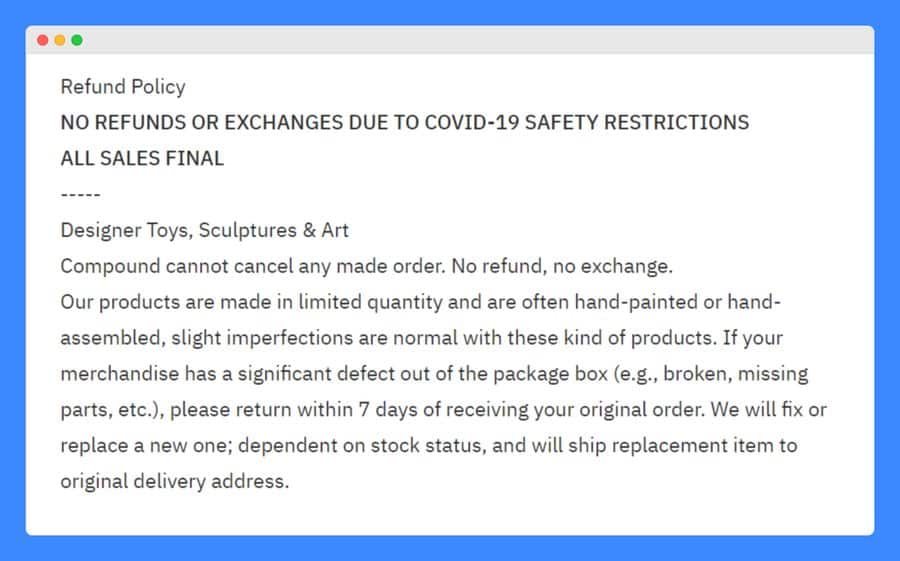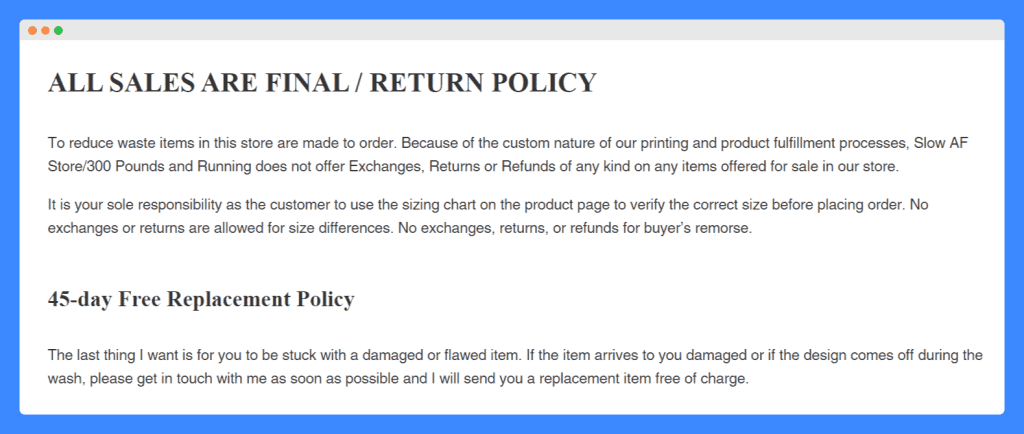When you’re starting an eCommerce business, there are an awful lot of moving parts to think about. One part, in particular, that should be at the top of your mind is your store policies on returns, refunds, and exchanges.
While purchase returns are a pretty normal part of any type of product sale, they’re something business owners want to avoid. As your accountant will tell you, purchase returns equal lost revenue.
The good news is, there are ways to limit these types of complaints. One great way to do so is by implementing an “all sales are final” policy. Let’s take a look at what these are, how they work, and why you need one!
Table of Contents
PRO TIP: Take the hassle of writing your own refund policy away with our refund policy generator trusted by over 200,000 businesses. It’ll save you hours of work and help increase sales in minutes.
What is an All Sales Are Final Policy?
The “all sales are final” or “final sale” policies are rules implemented by business owners that state customers cannot return or exchange certain items once they buy them.
These policies are similar to no refund policies. The difference lies in that no refund policies allow customers to exchange items even though they can’t get a refund. With an all sales are final policy, you can’t return or exchange the item.
Brands usually apply all sales are final policies to the following items:
- Clearance sale items
- Personalized items
The reason for this is that if a customer returns these items, the company can’t recuperate the lost cash. With this type of policy, however, stores can mitigate sunk costs.
Just keep in mind that there are often a few exceptions to these rules. For example, if a customer purchases an item that turns out to be damaged, you may have a clause that allows them to exchange it or get a refund.
Is it Legal to Have a Final Sale Policy?
If you’re thinking that this all sales are final policy is sounding too good to be true, don’t panic.
In general, these types of policies are completely legal. Of course, this does vary a bit depending on where you’re operating your business.
Let’s take a look at a few major regions and their laws surrounding all sales are final policies.
USA
Under federal US law, there are no limitations on all sales are final policies. In other words, it’s completely legal to have an all sales are final policy in the United States.
Of course, states have their own regulations. While these might not say you can’t make an all sales are final policy, they definitely state how you need to phrase the policies that you choose to implement.
Failure to meet these regulations can result in fines and other issues.
Before setting up a US-based business, make sure that you look into both federal and state regulations. That way, you can create final sale policies that protect your business and adhere to the law.
Canada
In Canada, all sales are final policies are legal. Just remember that Canadian law requires businesses to physically display their policy in the store somewhere.
If you’re an eCommerce business owner, make sure that your final sale policy is clearly listed somewhere on your site. Otherwise, you could find yourself in some hot water.
Another thing to note about final sale policy laws in Canada is that the Canadian government is a bit less forgiving to the customer than some US state governments. Where many US state governments will require businesses to honor defective returns, Canada doesn’t.
However, it’s up to you whether or not you want to honor this in your own store. Even though you’re not required to do so, goodwill returns can be a great way to gain customer loyalty.
United Kingdom
Like the US and Canada, the United Kingdom also allows merchants to follow final sale policies.
However, there is one key exception: business owners must accept refunds or returns for defective items or goods that weren’t as described.
Another thing to note is that the UK has different regulations for online transactions, phone transactions, and email transactions. With these types of transactions, merchants have to offer a refund if the customer notifies the online business of the return within 14 days of purchase.
For eCommerce businesses, knowing these regulations is critical to staying out of trouble. If you fail to provide a refund within 14 days of the customer notifying you of an issue, you could face the consequences of consumers’ rights misrepresentation.
Europe
Rules in Europe regarding final sale policies are pretty similar to those in the United Kingdom. Customers are entitled to a refund or exchange within 14 days of a digital purchase for any reason at all.
What’s different, however, are purchase returns at brick-and-mortar establishments.
In Europe, when a customer returns a defective item businesses have numerous options for how to respond. They can:
- Offer a price reduction
- Offer an exchange
- Offer a refund
- Offer to repair the item
As a result, businesses have a lot more leeway in how they respond to customers with defective goods.
Australia
Australia’s rules surrounding all sales are final policies are much stricter than in other countries.
Under Australian Consumer Law, it’s actually illegal to have a no refund policy. So, while merchants can definitely implement an all sales are final policy, they’ll be obligated to at least replace an item if a customer chooses to return something.
The rule applies to all stores, including online and physical shops. So, even if you’re operating an eCommerce shop, you’ll still have to adhere to these rules.
Examples of All Sales are Final Policy
Now that you’ve got a better feel for the legislation and legalities surrounding all sales are final policies, let’s take a look at a couple of examples from real eCommerce companies. This way, you’ll be better prepared in creating your own.
Compound

Compound, a global lifestyle brand offering apparel, toys, and collectibles, has a great example of an all sales are final policy.
Compound created its final sales policy because of the Covid-19 pandemic. According to them, to limit contamination and spread of the virus, they implemented an all sales are final policy. Under these terms, customers are not entitled to refunds or exchanges.
The one exception to their rule is if an item is defective. Compound added a clause offering returns or exchanges within seven days of purchase for these situations.
The Slow AF Run Club

The Slow AF Run Club gives us another example of a final sale policy. Like Compound, Slow AF only allows returns in the event that an item is defective.
The difference is that Slow AF Run Club allows up to 45 days for the return or exchange of a defective item. Their only stipulation is that customers have to provide the original receipt with the return.
How to Write An All Sales Are Final Policy
Once you’ve decided to create an all sales are final policy for your company, you’ll need to know how to write one. This is important for creating a legally binding agreement that customers understand.
Check Your Location’s Laws
Before you sit down to write an all sales are final policy, make sure to check not only your country’s laws but your local municipality’s laws as well.
You’ll need to make sure that you adhere to all federal, state, and local regulations on what can and cannot be included in your policy. You’ll also need to check the requirements on how you need to display your policy.
Doing so helps ensure the validity of your policy.
Define Your Terms
Once you have a clear understanding of what’s permissible in a final sale policy for your area, it’s time to define your terms.
Use clear language so that customers clearly understand your policy and so that there can be no loopholes or misunderstandings.
Choose Exceptions and Add-Ons
After stating your general terms, it’s time to come up with any exceptions to your final sale policy. Oftentimes, this is where businesses add a clause about defective returns.
If you do add exceptions, make sure to be explicit about the process for returning a defective item. The clearer you are, the less likely you are to run into any issues later down the line.
Add a Customer Acknowledgement
Although not always necessary, many eCommerce businesses choose to add a customer acknowledgment of the policy at checkout.
You’ll often see this as a checkbox right before purchase, which customers must tick stating that they agree to the purchase terms and conditions.
Adding this tickbox can be an extra safeguard in the event that a customer tries to take you to court over not accepting a return or exchange.
Frequently Asked Questions
Can Companies Refuse Refunds or Return Requests?
Depending on where your business is registered, companies can refuse refunds and return requests. In general, however, companies must accept defective items or items that weren’t as advertised for a return or refund, regardless of what their usual policy is.
What Does It Mean if a Product is Final Sale?
This means that you are not able to return or exchange a product after purchasing it. In some cases, there are minor exceptions to this rule, depending on where you live.
Can I Have an All Sales Are Final Policy?
In most countries, yes. All sales are final policies that are legal, although your particular state, country, or locality may have stipulations about accepting items in specific situations.
Does ‘Final Sale’ Mean No Exchanges?
The final sale means that when you complete a purchase, you aren’t able to make an exchange or return. Some businesses may have exceptions if the item was broken or defective upon sale.
What Are My Rights When a Store Says that All Sales Are Final?
This depends on the country you live in, but in general, you do not have any rights to returns or refunds if stores have an all sales are final policy in place.



